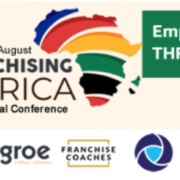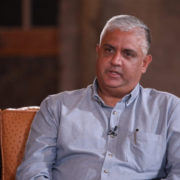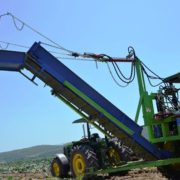Are You a Workaholic?

by Safiyyah Boolay-Jappie
“Workaholism is an addiction, and like any other addiction, it blocks creative energy.”
— Julia Cameron
If 2020 were a person, he would no doubt be in therapy, and not simply because it has become the butt-end of countless jokes and the face of endless memes. No, 2020 would be in therapy because it has had to shoulder the blame for upending ‘normality’ and wreaking havoc on legions of lives, households, careers and businesses across the globe.
And yet, there are those who choose to see this unforgettable year as a disruptive, but merciful interlude. A time to step back, to take stock and to make some meaningful changes. They, like me, are not 2020 / pandemic denialists. This year has been rough. For everyone. No exceptions. Even if you were not directly impacted by the 2020/pandemic trifecta of loss of loved ones, personal health scares and loss of security, you have undoubtedly been affected by the loss of routine, the stressful and unwelcome fusion of your different life roles, the frustrating and painful constraints on human interaction and on escape, and the rolling uncertainty it has brought.
On the upside, the lockdown has challenged ideas about work and personal time and put a spotlight on the ways work has hurt our personal as well as our collective well-being. It has certainly clarified problems with views about productivity and workaholic culture while illuminating the value of technology for enabling better work-life balance.
Technology, long available, has now been received widely as viable and acceptable alternatives for in-person meetings and work attendance, and many, many employees have repurposed time ordinarily lost to their commute for fitness, hobbies, learning and just enjoying time to themselves.
Lockdown has also opened the eyes of many a 8-5 stalwart about what can be achieved without watching people’s comings and goings. The world of work has changed. For many, there has been a significant improvement.
Yet, for others, working from home has meant working longer and harder. Sure there was the initial adjustment and the ensuing confusion borne from a forced industrial revolution. Once the dust settled and company meeting policies caught up with the sanity-preservation needs of their staff, work ambled back to a familiar level.
Over the last few months I have had occasion to ‘e-meet’ a number of professionals who quite literally oozed and pulsated stress, anxiety and overwhelm. The collapse between their home and work lives have highlighted painful tensions that live within them. In light of work uncertainty, they’ve worked harder and they’ve consistently worked longer hours, whilst juggling parenting, housekeeping and the stress of almost permanent co-existence with their loved ones who they had hitherto only spent the bookends of the day with. In the face of growing work uncertainty, they’ve over-compensated and denied themselves permission to switch off and they’ve dwelled in a haze of unspecific dread.
With mounting exhaustion and declining productivity, these beautiful people were over-functioning at the expense of their well-being and the sanity of those around them. They had found ways to manufacture busyness far beyond what was required of them. Instead of taking advantage of the benefits lockdown had brought to them, they cycled through bouts of unending work cycles and exhausted crashes.
What does it mean to be a workaholic?
Workaholism, together with its close relative, Perfectionism, are famed to be the ‘Best Dressed’ problems of the 21st Century. In a society that celebrates a brutal work ethic, there is unspoken pressure to deliver excessive performance. What is critical to understand is that when the source of this excessive performance is workaholism, the excessive performance does not amount to the equivalent of excessive, or even additional contribution and value.
Instead, workaholism is little more than a defence against unwelcome emotional states. At best, it is a self-soothing mechanism to temper anxiety, frustration, and the fear of being found out as an imposter who is unworthy.
“A rescuer isn’t always a person. Addictions to alcohol or drugs, sexual addiction, workaholism, – all the ways in which we numb out – can rescue the victim from feeling his or her own feelings.” David Emerald Womeldorff
In my experience, there are a few key indicators that workaholism may be at play. As they are listed below, the root cause of a workaholics’ dysfunctional relationship with their work revolves around the fuel they employ to drive their work. The workaholic approaches work from a place of stressful and scarcity thinking, using work in much the same way as other addicts use their poison of choice.
-
A workaholic works excessively at his or her own discretion. Despite the fact that there are no real extrinsic pressures to work excessively, workaholics are reluctant to disengage from work, and even when they do physically disengage from work, they remain pre-occupied with their work, despite the countless other things and/or people that need their focus and attention.
-
Workaholics work extremely long hours for protracted periods of time, particularly at night, resulting in diminished recovery and rest patterns, which in-turn interferes with their capacity to manage life’s challenges and to self-regulate.
-
They work without holidays and breaks, despite the fact that they have sufficient leave / time-off available to them. More often than not, workaholics have too much leave available to them, that they are flagged as being in violation of company leave policy and are often put on mandatory leave.
-
Workaholics get lost in continuously stressful work, at the expense of their important relationships and without having due regard for the other aspects of their lives.
-
It is common for workaholics to separate themselves from others, preferring to focus on the details of their jobs, often at the expense of its bigger picture, and also at the expense of the bigger picture of their careers and lives.
-
They over-function because they feel a disproportionate level of responsibility for the outcomes of their team and/or company. When things go wrong, it is typical for the workaholic to over-personalise the outcomes and to experience feelings of guilt and even shame because of these outcomes.
-
Who they are and what they do become so deeply intertwined, that the workaholic relies of their work for their sense of self and for their worth. Their identities are virtually consumed by their work and all the paraphernalia that goes with their jobs.
This is so prevalent in certain industries that this is the norm and is perceived to be the entry standard for experiencing success in those industries. Because of this normalization, many workaholics fail to see this as an issue, especially if they really do enjoy the work that keeps them occupied.
“Our Reverence for workaholism has produced corporate leaders that believe that they do not need sleep, and neither should anyone else.”
— Stanley Cohen
This is the true plight of the workaholic. Their addiction is approved of, even celebrated. They are rewarded in countless ways for their dysfunction. Working, after all, is a part of life that is fulfilling by itself. It can be hard for others as well as for the workaholic to see how they are short-changing themselves by misusing their work.
Is there a difference between being engaged, a workaholic, and being hard working?
There is a massive difference between being a workaholic and being an engaged or hard worker.
A key distinction that I very specifically identify with is that the hard worker may be engaging in their work, whilst daydreaming of being on the beach or with loved ones. Conversely, a workaholic will be on the beach or with their loved ones, whilst being pre-occupied and distracted to the point of frustration, by yearnings to be back at their computer, grappling with their work; this despite the fact that no urgency is required.
Being engaged in work implies that the work is a source of positive fulfilment, that it is absorbing and that it charges the mind. On the surface working hard, being engaged and workaholism can look identical. There is a vast difference in motivation though. Whilst the engaged worker is absorbed by and stimulated by his/her work, the workaholic relies on work for his/her identity, sense of self and sense of belonging/place in the world.
Working hard is really about deploying effort proportionate to the demands of the work. For example, during tax season, accountants and tax experts work longer hours and serve their clients at a greater level. When the tax season passes, their level of effort will abate commensurate with the real prevailing demands of their work. The workaholic on the other hand will manufacture work demands to escape dealing with and attending to other aspects of their lives.
What are the consequences of workaholism?
Compounded by the pandemic, stress is epidemic in todays’ world of work. It is epidemic in every aspect of life, but work stress bleeds into all the various facets of our lives. This is simply unavoidable, despite the most vigorous protestations to the contrary.
Physical and mental responses to stress are useful and vital, they are meant to be brief. There is no part of your being that will be spared from protracted exposure to stress.
Our brain’s response to stress is to activate your stress response by releasing a ‘get-moving’ chemical cocktail that includes cortisol and adrenalin. In most instances, workplace stress does not invoke a ‘get-moving’ response, despite the fact that your body is readying itself for this very response.
Unable to do its job, the chemical cocktail is left to loiter in your body, wreaking havoc with:
-
Your internal organs and driving them to over-perform, leaving you open to future blood-pressure related complications like heart-attacks and stroke;
-
Your sleeping patterns, exposing you to protracted periods of insomnia, which in itself compromises your brain and your body’s recovery processes and how you retain information;
-
The way in which you interpret event and situations around you. Hopped up on cortisol you are more prone to being a glass half-full kind of person and seeing everything as a threat;
-
Your ‘in-the-moment’ decision making, especially as it relates to choices in nutrition and choices in doing things in moderation. You become more prone to ‘all-or-nothing’ thinking and in your exhausted state, when you can’t be ‘all-good’, succumbing to excess becomes a really easy choice. When you are exhausted, your pursuit of quick energy fixes in the form of simple carbs, coffee and sugar is automated, compounding your workaholism with other dietary addictions;
-
Your physical fitness becomes nothing more than a fanciful notion. You simply don’t have the energy or the ‘time’ to get into a fitness routine.
-
Your immune system, which is now under siege because it is not get the nutrition it needs, not the benefit of the essential sleep processed it relies on to be able to mount a meaningful threat to attacks on your health.
-
Your professional life suffers because you’ve lost sight of the big picture, and in your exhaustion, you lose perspective, personalising things and becoming defensive. Your error rate and rate of re-work increases, whilst taking personal responsibility becomes more challenging. Your network declines; even if they are physically constant, their investment in your brand is on the decline;
-
Your personal life, which becomes the site of emotional and mental warfare is one of the biggest casualties of your workaholism, regardless of whether your personal life is representative of loved ones, or yourself. Perhaps this part of your life is what originally induced your workaholism. Now with your exhaustion, your lack of emotional wherewithal, and your narrowed perspective, you struggle to show up as an engaged, enabled citizen. The alienation you feel in this part of your life exacerbates your workaholism and locks you into a catastrophic relationship with your work and with yourself that will ultimately drive you to burning out.
While doing great work is great and virtuous, there are no positive outcomes from workaholism.
What can you do about it?
Recognising workaholism for what it is, is a critical first step. Let me reiterate: workaholism is not the same as working hard; it is not the same as creating high value. It is an avoidance strategy and it does not serve you, it does not serve your team, it is of no value to your customers, and really should be unwelcome in your business.
If you are concerned about your workaholism, there are measures you can take to stop it from taking its toll on your mental, emotional, social and physical well-being.
-
The most obvious is to take a break. A break will give you the space to get perspective on your priorities; at work, and in your broader life. More valuable to your long-term well-being, is ritually creating the time and space you need to reflect and to re-orientate your focus and energy from reacting to being in command of your agenda. As a workaholic, walking away from work may be the last thing you want to do and it may be the hardest thing for you to do; but a vacation from work can do wonders for your soul, your mind and your emotional well-being. It is restorative and after you’ve disconnected from work for a few days, the benefits of your break will become self-evident and you will be pleased and relieved by your choice to create some space for yourself.
-
If a break or a vacation is not possible, canvas the prospects of medical leave available to you.
-
Become deliberate about designating time and places in your life as being work free. Something as simple and accessible as dinner could be one of those times. A walk could be another. Don’t make it complicated. Just put it in your schedule of non-negotiables.
-
Make sleep a priority. Sleep is not just passing out. Sleep is restorative to you physically, mentally and emotionally. Your ability to contribute at a high level and to live at a high level dictates that you prioritise sufficient sleep.
-
Get better nutrition. There are countless ways to do this. Whatever you do, be ready and have good nutrition on hand. If you’re not ready, you’re going to find yourself on a slippery slope to cheap highs that are short-lived and without any real sustenance.
-
Move your body. You don’t have to commit to a marathon. A walk, a skipping rope, a start. That is all that is needed.
-
Play. Really, make time to play. As adults we become far too serious about everything. Yet, play is the most natural state for us to be in. It allows us to be in the moment, without pre-conceived ideas of how things must turn out. It’s our most powerful learning state. If you’re competitive, find ways to play that don’t suck you into the dragon states of competition and comparison. Don’t make it complicated; just have a moment of fun. The endorphins can be life-altering. And laugh. The world needs more laughter. Your world does too.
-
The things you’re trying to avoid, approach them with self-compassion. Get a journal, speak to yourself in the mirror. Do whatever you need to do to get the gunk out of your head and do that you can start looking at it objectively and from different, more enabling perspectives. Get support if you must. This is primary. Until you approach this, work will forever be a place of escape, and cannot become a place of creation and contribution.
-
Connect. Our happiness is predicated on our relationships. Research is resolute in the finding that people in good, healthy relationships fair better in life and in health. Again, those endorphins and other feel good hormones are just waiting for you to cue them so that they can help you live better. Give them the go-ahead. Connect.
-
Contribute. In the end, all contribution is selfish. We do it so that we feel better and to feel like we matter and that we have a place in the world. It is by far the most perspective changing thing you can do. Underestimate the power of contribution at your peril.
“Play. Really, make time to play.”
In conclusion, how you draw the line between happy productivity and destructive work addiction? The short answer is this: good productivity brings happiness and satisfaction. Workaholism, however, brings anxiety, depression, ruined relationships and adversely affects your health. Workaholics work for the sake of working and to escape a reality that that they perceive as uncomfortable and too challenging to address. Having time off work makes them scared and anxious, not because they miss the work per se’, but because work is their way to deal with anxiety and avoid facing other issues in their lives. Unfortunately, while workaholism might seem like a good painkiller, it comes with its own side effects. And these side effects can ruin your life. Small adjustments can quite literally save your relationships, allow your career to prosper and restore your vitality. No-one can afford to keep their noses to the grindstone without coming up for air. Nor can you.

Safiyyah Boolay-Jappie is a life coach, based in South Africa. She helps high achieving, ambitious women to create impactful careers without sacrificing their well-being, themselves, their relationships, and quality of life. She helps women to beat burnout and to thrive. Having worked in the corporate world for 20 years, most of these in complex leadership roles whilst raising two children, she understands the demands being juggled by professional women, both in their professional and personal lives. Today, she wants to share those learnings with other women through her personal coaching and training.
More articles by Safiyyah















